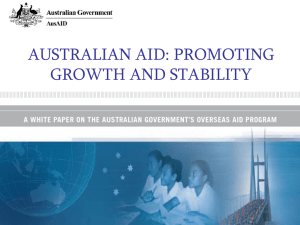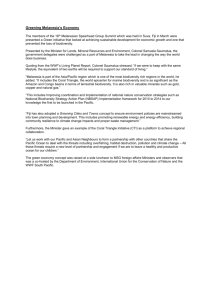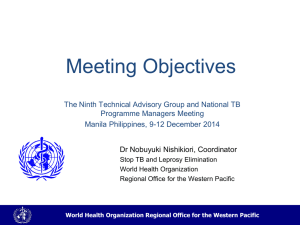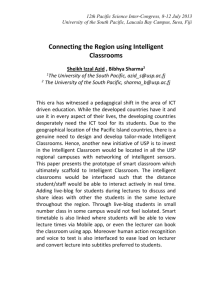Improving women`s livelihoods - Department of Foreign Affairs and
advertisement
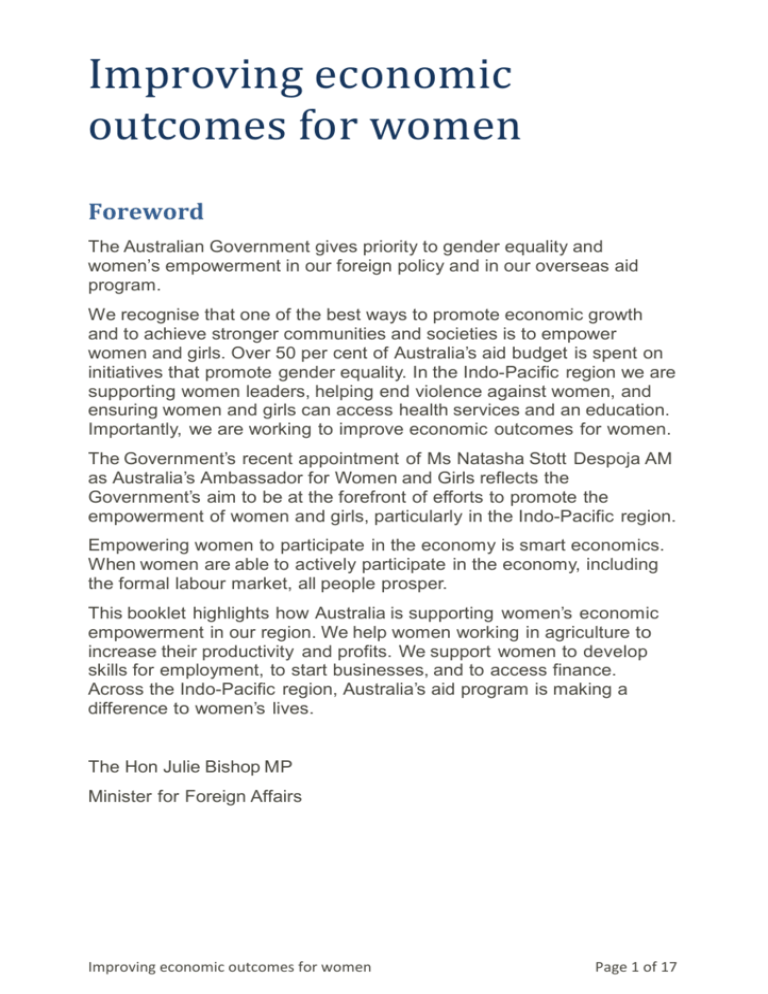
Improving economic outcomes for women Foreword The Australian Government gives priority to gender equality and women’s empowerment in our foreign policy and in our overseas aid program. We recognise that one of the best ways to promote economic growth and to achieve stronger communities and societies is to empower women and girls. Over 50 per cent of Australia’s aid budget is spent on initiatives that promote gender equality. In the Indo-Pacific region we are supporting women leaders, helping end violence against women, and ensuring women and girls can access health services and an education. Importantly, we are working to improve economic outcomes for women. The Government’s recent appointment of Ms Natasha Stott Despoja AM as Australia’s Ambassador for Women and Girls reflects the Government’s aim to be at the forefront of efforts to promote the empowerment of women and girls, particularly in the Indo-Pacific region. Empowering women to participate in the economy is smart economics. When women are able to actively participate in the economy, including the formal labour market, all people prosper. This booklet highlights how Australia is supporting women’s economic empowerment in our region. We help women working in agriculture to increase their productivity and profits. We support women to develop skills for employment, to start businesses, and to access finance. Across the Indo-Pacific region, Australia’s aid program is making a difference to women’s lives. The Hon Julie Bishop MP Minister for Foreign Affairs Improving economic outcomes for women Page 1 of 17 Contents Foreword ....................................................................................................... 1 Improving women’s livelihoods .................................................................. 3 Putting it into practice: Improving women’s livelihoods through access to safe markets in Papua New Guinea ....................................................... 3 Putting it into practice: Improving the livelihoods of extremely poor women in Bangladesh ................................................................................. 4 Putting it into practice: Supporting women’s livelihoods through access to banking in the Pacific ............................................................................. 5 Putting it into practice: Empowering women through savings in TimorLeste ............................................................................................................ 6 Education and skills for economic participation ...................................... 7 Putting it into practice: Providing women with access to technical training in Vanuatu ...................................................................................... 8 Putting it into practice: Providing scholarships to women in Indonesia ..... 9 Entrepreneurship and private sector development ................................ 10 Putting it into practice: Working with the private sector to increase women’s employment in Fiji ...................................................................... 10 Putting it into practice: Supporting changes to legislation that encourage women’s business development in Solomon Islands ............ 11 Putting it into practice: Supporting women’s micro-enterprises in Nepal 12 Supporting women business leaders ....................................................... 13 Putting it into practice: Women leading change in Papua New Guinea .. 14 Putting it into practice: Working with women business leaders in the Pacific ........................................................................................................ 15 Putting it into practice: Supporting women business leaders in Solomon Islands ....................................................................................................... 16 Creative Commons ................................................................................... 17 Improving economic outcomes for women Page 2 of 17 Improving women’s livelihoods Women in developing countries face multiple constraints in accessing employment and livelihood opportunities. Many poor women in developing countries work in agriculture or in informal trading. They grow and sell food to meet basic needs but often make very little money doing so and they work in poor conditions. Women regularly miss out on the agricultural information and technology needed to improve their productivity and increase profits. To improve their economic possibilities and contribute to food security and economic growth, women need access to capital, skills, technology and markets. Women also need access to diverse formal jobs: jobs that are safe and stable; jobs that enable them to use their skills and talents to earn more money. As well as access to employment opportunities and income, women also need to have control over what they earn and be able to decide how to spend their money to lift themselves and their families out of poverty. Women need access to banking and financial services to save and manage their money. Putting it into practice: Improving women’s livelihoods through access to safe markets in Papua New Guinea In Papua New Guinea, the Australian Government funds UN Women’s Safe Cities Programme to improve the livelihoods of women by making the markets in the capital, Port Moresby, safer for conducting business. A large majority of Papua New Guinea’s population work in subsistence agriculture, so giving women and girls safe access to markets to sell their produce is key. UN Women works with the Port Moresby National Capital District Commission, the police, women’s grassroots organisations and civil society organisations, to strengthen the role of police at the markets, improve the collection of vendor fees, and manage security, cleaning and maintenance services. Infrastructure changes made through the Safe Cities Programme are also helping women at the markets. The Gerehu Market, for example, has renovated its bathrooms and showers, installed potable running water, and renovated stalls and shaded areas. A vendors’ association was also established to manage market issues. The association’s work has included improving security to enable vendors to work without harassment. Improving economic outcomes for women Page 3 of 17 Putting it into practice: Improving the livelihoods of extremely poor women in Bangladesh 1 In Bangladesh, the Australian Government supports BRAC’s Targeting the Ultra Poor, a ground-breaking program promoting and protecting the livelihoods of extremely poor women. Since 2002, the program has reached more than one million rural households and had a 95 per cent success rate in lifting women out of extreme poverty.2 The program provides the most disadvantaged women with grants, training and capital to build micro and small businesses. Recognising that capital is not enough, the program provides training and facilities, such as water pumps and toilets. It also gives women an allowance so they have ‘breathing space’ to develop their businesses. In addition, the program pays for education and healthcare needs of family members. BRAC: Turning women’s lives around Shubashini married when she was 14 and has five children. When her husband died, Shubashini’s family suffered and often went without food, clothes and other essentials. Shubashini was determined to turn things around. In 2005, she participated in BRAC’s Targeting the Ultra Poor Programme. She decided to raise cattle to make money. BRAC trained Shubashini in business, life skills and networking. It gave her two cows, assistance to build a cow shade, and a weekly stipend to keep her going until she started earning money. BRAC also gave Shubashini healthcare and support from the village poverty reduction committee. After graduating, Shubashini took out loans from BRAC’s microfinance program. She rented land, grew rice, paid off her loans, started a shop and built a house. With her determined spirit, Shubashani transformed her life in just two years.3 1 Based in Bangladesh, BRAC is one of the largest non-government organisations in the world. 2 BRAC, 2013. BRAC Annual Report 2012. Bangladesh, p. 36. 3 BRAC, 2013. BRAC Annual Report 2012. Bangladesh, p. 37. Improving economic outcomes for women Page 4 of 17 Putting it into practice: Supporting women’s livelihoods through access to banking in the Pacific In Fiji and other Pacific countries, the Australian Government is helping to address a major barrier to women’s economic empowerment—lack of access to financial services—through support for the regional, multidonor Pacific Financial Inclusion Programme. When women cannot access credit or bank accounts, it is difficult for them to plan, build businesses or achieve their full economic potential. The program provides women with access to mobile money, a quick, low-cost way to transfer and receive funds. Since 2009, the Pacific Financial Inclusion Programme has provided more than half a million people across Fiji, Samoa, Tonga and Vanuatu with access to mobile money. A total of 38.5 per cent of users of this service are women.4 The Pacific Financial Inclusion Programme also increases women’s access to bank accounts, enabling them to save and manage money better. In Fiji, the program works with the Department of Social Welfare to improve access to government welfare payments through electronic means. In Fiji, more than half of these 23,100 social welfare clients are women. Saving for a rainy day Makereta, from Fiji, is a single mother of four boys who also cares for her bedridden uncle. Makereta never had a bank account and always found it hard to save money. To collect her monthly family assistance from the Department of Social Welfare, Makereta would have to collect a voucher and then cash it at a post office. This often took up to half a day. Life changed for Makereta after the Fiji Government, with support from the Pacific Financial Inclusion Programme, started to pay welfare recipients directly into a bank account instead of through vouchers. She was given a smart card to use to access her money, only paying a small transaction fee. Makereta says having her money going directly into her bank account is a blessing. It saves her valuable time and makes it easier to save for a rainy day. 4 United Nations Capital Development Fund / United Nations Development Programme, Pacific Financial Inclusion Programme, 2013. Financial Inclusion and Gender in the Pacific. Suva, p. 2. Improving economic outcomes for women Page 5 of 17 Putting it into practice: Empowering women through savings in Timor-Leste In Timor-Leste, the Australian Government funds the International Women’s Development Agency to work with local in-country partners to help women develop micro-businesses and savings clubs. The program is improving women’s livelihoods by building their financial independence and developing their leadership skills. It provides women’s groups with either start-up funds or materials, training and ongoing support in finance, business and leadership skills. It also facilitates linkages with markets and works with men to gain support and raise awareness of the barriers women face in establishing their microbusinesses and savings clubs. Increasing women’s control over their income The Australian Government funds the International Women’s Development Agency to work with local Timor-Leste groups to help women develop micro-businesses, build leadership skills and save to become financially independent. Beatris do Santos leads one such group, Haburas Goronto. The members of this women’s group generate income through weaving tais (traditional fabric), raising chickens and making cakes. The group now has its own bank account and uses its savings for positive change. These include supporting children’s schooling and providing members with loans to buy household and other items that benefit their families. Improving economic outcomes for women Page 6 of 17 Education and skills for economic participation Education and training give women the knowledge, skills and selfconfidence they need to earn an income, including through higher paying jobs and by starting their own businesses. Globally, women are significantly under-represented in higher education and vocational training. Education at this level offers women increased pathways to employment as well as opportunities to build a stable life for themselves and their families. Even when better educated, women around the world still spend significantly more time than men looking after children, cooking, collecting water and fuel, caring for relatives and handling other household responsibilities. This limits the time they have available to participate in educational programs and undertake income-earning 5 activities. Investments in time and labour saving technology, infrastructure and child care are therefore important for freeing women’s time and increasing their productivity. 5 World Bank, 2011. World Development Report 2012: Gender Equality and Development. Washington, p. 215. Improving economic outcomes for women Page 7 of 17 Putting it into practice: Providing women with access to technical training in Vanuatu In Vanuatu, the Australian Government is working with the Government of Vanuatu to empower local women to increase their income-earning potential and serve an expanding private sector through accessing technical and vocational skills and training provided by the Technical and Vocational Education and Training (TVET) Sector Strengthening Program. Since 2009, more than 150 accredited training courses and approximately 200 business development workshops have been delivered to over 5000 rural participants. Due to a concerted effort to promote equity, 44 per cent of all trainees have been women, including a good representation of people with disability.6 Educating women in non-traditional trades Gail Waki and Rina Alau are graduates of the Vanuatu Institute of Technology who furthered their skills at the Australia–Pacific Technical College in Fiji (also supported by the Australian Government). Both work in traditionally male-dominated trades and deliver skills training in rural communities in Vanuatu as part of the TVET Sector Strengthening Program. Gail teaches masonry and tiling and Rina teaches electrical wiring. Although men continue to make up the majority of trainees in the trades in Vanuatu, the fact that these two trainers are women is a big step forward in breaking down perceptions about women’s roles and their ability to work in a range of jobs. 6 AusAID, 2012. Vanuatu TVET Sector Strengthening Program Phase II: Final Evaluation Report. Canberra, pp. 4 & 41. Improving economic outcomes for women Page 8 of 17 Putting it into practice: Providing scholarships to women in Indonesia The Australian Government supports women to undertake study, research and professional development in Australia through the Australia Awards Program. In 2012 alone, the Australian Government supported more than 2400 women from more than 145 countries in this way. The program equips the next generation of global female leaders with the skills and knowledge required to support growth and development in their countries. It has supported many successful female leaders who are now playing important roles in policy development and in implementing programs that are improving the lives of women. In Indonesia, Australia Awards’ graduate Netty Muharni is improving the lives of women in Aceh. After the 2004 tsunami hit, Netty resolved to help people get on with their lives through rehabilitation and reconstruction programs. She completed her Master of Urban and Regional Planning at Curtin University of Technology in Perth (2007) and is now Head of the Promotion Division, at the Aceh Investment Coordinating Board. Netty is also General Secretary of Aceh’s National Craft Council, a notfor-profit organisation that helps women improve their economic wellbeing by sharing knowledge and skills. Netty received an Australian Alumni Award in the Inspirational Alumni Awards category in 2009. The Australian Alumni Awards are an initiative of Australian Education International at the Australian Embassy in Indonesia. Improving economic outcomes for women Page 9 of 17 Entrepreneurship and private sector development Entrepreneurship and private sector development are fundamental to economic growth and are significant sources of women’s employment. As entrepreneurs, women create jobs and grow national economies. In many parts of the world where women have limited access to jobs, micro and small enterprise are their main source of income. With income earned from their businesses, women can support their families and communities to prosper. Women encounter gender-specific obstacles that cannot be easily overcome without external help. Discriminatory laws, policies and attitudes often make it difficult for them to access land, financial services, technology, training and markets. Creating an enabling environment by addressing these obstacles is important, including through providing start-up funding or loans, access to banking as well as business and financial training. Removing legislative barriers can also assist women establish and grow their businesses. Putting it into practice: Working with the private sector to increase women’s employment in Fiji Across Asia and the Pacific, including in Fiji, Australia has drawn on private sector experience to improve women’s access to employment, training, financial services and technology through the Enterprise Challenge Fund. The private sector accounts for almost nine out of 10 7 jobs in developing countries. The fund has provided grants to businesses to help create jobs and income-earning opportunities. It has also supported businesses to improve access to markets and extend financial services, technology and agricultural products to poor people. Since 2007, 22,139 women have benefitted from grants provided to businesses by the Enterprise Challenge Fund.8 In Fiji’s Nature’s Way factory, an Enterprise Challenge Fund grant to provide labour-saving technology has increased women’s access to employment by enabling them to work in roles only previously performed by men. The factory heat-treats fruit and vegetables for export. Traditionally, women only worked in the company office, because working on the floor or in manual packing and grading was considered too tough. Through the grant, Nature’s Way bought automated packing and grading equipment and women now work in 7 World Bank, 2012. World Development Report 2013: Jobs. Washington, p. xiii. 8 Enterprise Challenge Fund, 2013. Women’s Economic Empowerment, Practice and Policy Implications from the Enterprise Challenge Fund. Canberra, p. 7. Improving economic outcomes for women Page 10 of 17 factory-floor positions. Putting it into practice: Supporting changes to legislation that encourage women’s business development in Solomon Islands In Solomon Islands and elsewhere in the Pacific, the Australian Government and the Asian Development Bank are working with Pacific Island governments to support private sector development, improve the business-enabling environment and focus on women’s economic empowerment. They are doing so through the Pacific Private Sector Development Initiative. The initiative provides technical assistance to assist Pacific countries increase incomes, jobs and economic growth through private sector growth. It provides advisory services to support law reform to create an easier environment for business; promotes access to finance, including through expanded access to financial services and innovative technologies; and it is improving the efficiency of state-owned enterprises and public- private sector mechanisms. In Solomon Islands, the Pacific Private Sector Development Initiative has supported the Solomon Islands Government to reform company legislation and compliance procedures. These reforms have made it easier to register companies and file annual returns. As part of the reform implementation, women and women’s community groups have been provided with advice and training on the reforms. Since the new Companies Act became effective in July 2010, the number of women company directors has increased by 29 per cent and the number of women shareholders by 15 per cent.9 9 Asian Development Bank, 2013. Progressing Reform: Developments and Achievements in 2012/13 Pacific Private Sector Development Initiative. Sydney, p. 22. Improving economic outcomes for women Page 11 of 17 Putting it into practice: Supporting women’s micro-enterprises in Nepal In Nepal, the Australian Government supports the Micro-Enterprise Development Programme which aims to expand employment opportunities for the poor, youth, women and individuals from socially excluded groups through the development of micro-enterprises. Expanding employment opportunities Durga, from Nepal, has no formal education and comes from a poor family. Eleven years ago she struggled to feed her family of eight with two meals a day on her husband’s salary. Determined to educate her children and give them a better chance in life, Durga dreamt of becoming an entrepreneur. Durga was able to realise her ambitions when the Micro-Enterprise Development Programme, funded by the Australian Government, selected her for Start and Improve Your Business entrepreneurship development training. Through her training, she developed a business plan for selling herbal soap and built her skills. Durga established the Jhimruk Herbal Soap Industry, making and selling herbal soap locally. She began exporting six types of soap to Japan, increasing her income 10 times over. Her husband now works in her business and Durga employs seven people. Durga’s three daughters have all completed their education. Improving economic outcomes for women Page 12 of 17 Supporting women business leaders Harnessing women’s talent in the workforce, including as political leaders, business leaders and key policy makers, makes sound business sense. It makes societies stronger and more stable. Yet women around the world are under-represented in leadership positions in business, government and other sectors. Discriminatory laws, practices, attitudes, stereotypes, low levels of education, and limited networks are some of the barriers women face in taking on leadership roles in business. Women need mentoring, support and training to take on leadership roles. They also need to be part of private sector policy development. Improving economic outcomes for women Page 13 of 17 Putting it into practice: Women leading change in Papua New Guinea In Papua New Guinea, the Australian Government supports the Papua New Guinea Business Coalition for Women as part of the Pacific Women Shaping Pacific Development program.10 The coalition works with the private sector in Papua New Guinea to increase the number of women leaders in business to develop better policies and practices to enable women to succeed at work. Improving economic outcomes for women Lady Winifred Kamit CBE11 is using her position as a leader to bring about change to improve economic outcomes for other women in Papua New Guinea. Lady Kamit has had a pioneering career in law, business and the public service, including as Commissioner of the Public Service Commission. She is founding Chairperson of the Coalition for Change and patron of the Papua New Guinea Business Coalition for Women. In her position as a Senior Partner in Gadens Lawyers and board member for numerous businesses, Lady Kamit says she is sitting where she can help Papua New Guinea to develop a consciousness about domestic violence and workplace equality. Lady Kamit says everyone, including government and private sector employers, needs to work together to create a work environment in which women can contribute and progress. ‘Because I am in the private sector, the balance sheet—the bottom line—is important,’ says Lady Kamit. ‘It is well known that where there are women in the balance sheet, the return to shareholders is better.’ 10 The Pacific Women Shaping Pacific Development program focuses on improving safety for women, increasing the number of women leaders and improving economic outcomes for women in the Pacific. 11 Commander of the British Empire. Improving economic outcomes for women Page 14 of 17 Putting it into practice: Working with women business leaders in the Pacific In the Pacific, the Australian Government supported the Pacific Women in Business Conference, held in November 2012 in Fiji. The conference was convened by the Pacific Islands Private Sector Organisation. It focused on women’s entrepreneurship, and brought together government, civil society organisations and business women to network, support each other, increase trading potential, increase access to markets and showcase role models of women business leaders. More than 120 women attended. Supporting women in business Sukhia Tuimaleali’ifano Go, from Fiji, is a great example of what women can achieve when mentored by women leaders and given access to networks and training. After attending the Pacific Women in Business Conference, Sukhia started a handicraft business, quickly increasing her employee base from two to 11. At the conference, Sukhia met suppliers and other business women who were willing to share their knowledge. ‘With the support from other women, I was introduced to a masi12 buyer in Japan with whom I made my first business transaction,’ said Sukhia. ‘I also met the Chief Executive Officer for the Small Business Enterprise Centre, a semi-government organisation in Samoa, who supported my submission for business development funds.’ Improving economic outcomes for women Page 15 of 17 Putting it into practice: Supporting women business leaders in Solomon Islands In Solomon Islands, the Australian Government supports women’s businesses. It does so through the Solomon Islands Women in Business Association, which promotes and builds additional opportunities for women to participate in business at all levels. The association’s mission is to develop and empower women in the private sector. It provides support services to women entrepreneurs, including access to financial services, financial literacy support, skills training, mentoring and networking. Since its establishment in 2005, the association’s membership has increased from 100 to more than 480 women. A grant from the Australian Government through the Pacific Leadership Program was used to establish a secretariat and an office to attract more members. In 2012, the Solomon Islands Women in Business Association launched the bi-monthly Mere’s (women’s) Market in Honiara, offering women a safe space to sell their products. A record number of 90 women registered at the October 2013 market. Most women vendors earn significantly more in three days at the market than they do in a normal month of trading elsewhere. Some now opt to sell only at the Mere’s Market, which means they can spend more time at home in between markets, preparing new goods for sale. Improving economic outcomes for women Page 16 of 17 Creative Commons With the exception of the Commonwealth Coat of Arms and where otherwise noted all material presented in this document is provided under a Creative Commons Attribution 3.0 Australia (http://creativecommons.org/licenses/by/3.0/au/) licence. The details of the relevant licence conditions are available on the Creative Commons website (accessible using the links provided) as is the full legal code for the CC BY 3.0 AU licence. The document should be attributed as: Commonwealth of Australia, DFAT, Improving economic outcomes for women, January 2014. ISBN 978-1-74322-129-7 (Print) ISBN 978-1-74322-130-3 (PDF) Contact Inquiries about this document should be directed to: Department of Foreign Affairs and Trade RG Casey Building John McEwen Crescent Barton ACT 0221 Australia Phone +61 2 6261 1111 Fax +61 2 6261 3111 Published by the Department of Foreign Affairs and Trade, January 2014. Improving economic outcomes for women Page 17 of 17
